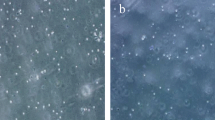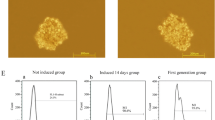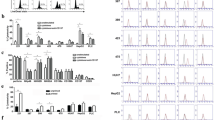Abstract
Objective: To improve the preparation of adherent lymphokine-activated killer (A-LAK) cells and study the synergistic anti-tumor effect of phenylacetate (PA) and A-LAK cells. Methods: A-LAK cells were obtained from peripheral blood mononuclear cells (PBMC) of patients with hepatocellular carcinoma (HCC) by using L-phenylalanine methyl ester (PME) to deplete immunosuppressive monocytes. The proliferation of SMMC7721 cell line treated with PA was studied. A-LAK cells were treated with the supernatant of SMMC7721 cells which had been pretreated with PA and the changes of the proliferation and anti-tumor activity of A-LAK cells were investigated. Results: The expansion of A-LAK cells was significantly higher than that of non-adherent LAK (NA-LAK) cells as well as regular LAK cells. The growth of SMMC7721 cells was significantly suppressed by PA. The supernatant of cultured tumor cells intensively suppressed the proliferation and cytotoxicity of A-LAK cells, but the suppressive effect of supernatant treated with PA previously was decreased. Conclusion: A-LAK cells could be simply prepared by using PME, and showed a synergistic anti-tumor effect with the combination of PA.
Similar content being viewed by others
References
Ye SL. Biotherapy of tumor. In: Tang ZY. Contemporary oncology [M]. 2nd ed. Shanghai: Shanghai Medical University Press. 2000; 513.
Bremers AJ, Parmiani G. Immunology and immunotherapy of human cancer: present concepts and clinical developments [J]. Crit Rev Oncol Hematol 2000; 34:1.
Cheng JD, Rieger PT, Von-Mehren M, et al. Recent advances in immunotherapy and monoclonal antibody treatment of cancer [J]. Semin Oncol Nurs 2000; 16(4 Suppl 1):2.
Ye SL. Biotherapy of hepatocellular carcinoma. In: Tang ZY, Yu YQ. Primary liver cancer [M]. 2nd ed. Shanghai: Shanghai Scientific and Technical Press. 1999; 382.
Hoffman DM, Gitlitz BJ, Belldegrun A, et al. Adoptive cellular therapy [J]. Semin Oncol 2000; 27:221.
Melden RJ, Whiteside TL, Vujanovic NL, et al. A new approach to generating antitumor effectors for adoptive immunotherapy using human adherent lymphokine-actived killer cells [J]. Cancer Res 1988; 48:3461.
Schwarz RE, Vujanovic NL, Hiserodt JC. Enhanced antimetastatic activity of lymphokine-activated killer cells purified and expanded by their adherence to plastic [J]. Cancer Res 1989; 49:1441.
Koberda J, Przepiorka D, Moser RP, et al. Sequential TNF and TGF-beta regulation of expansion and induction of cytotoxicity in long-term cultures of lymphokine-activated killer cells [J]. Lymphokine Cytokine Res 1994; 13:139.
Boiardi A, Silvani A, Ruffini PA, et al. Loco-reginoal immunotherapy with recombinant interleukin-2 and adherent lymphokine-actived killer cells (A-LAK) in recurrent glioblastoma patients [J]. Cancer Immunol Immunother 1994; 39:193.
Triozzi PL, Aldrich W, Kim J, et al. Biologic effects of the adoptive transfer of cells depleted of monocytes with L-phenylalanine methyl ester [J]. Immunopharmacol 1994; 28:39.
Riberiro-Dias F, Marzagao-Barbuto JA, Sajita M, et al. Discrimination between NK and LAK cytotoxic activicity of murine spleen cells by MTT assay: differential inhibition by PGE2 and EDTA [J]. J Immunol Methods 2000; 241:121.
Pardoll D. T cells and tumors [J]. Nature 2001; 28; 411:1010.
Schwacha MG, Schneider CP, Bland KI, et al. Resistance of macrophages to the suppressive effect of interleukin-10 following thermal injury [J]. Am J Physiol Cell Physiol 2001; 281:C1180.
Sakata T, Iwagami S, Tsarata Y, et al. The role of lipocortin I in macrophage-mediated immunosuppression in tumor-bearing mice [J]. J Immunol 1990; 145:387.
Bergmann L, Schui DK, Brieger J, et al. The inhibition of lymphokine-actived killer cells in acute myeloblastic leukemia is mediated by TGF-β 1 [J]. Exp Hematol 1995; 23:1574.
Hsieh CL, Chen DS, Hwang LH. Tumor-induced immunosuppression: a barrier to immunotherapy of large tumors by cytokine-secreting tumor vaccine [J]. Hum Gene Ther 2000; 11:681.
Han S, Wada RK, Sidell N. Differentiation of human neuroblastoma by phenylacetate is mediated by peroxisome proliferator-activated receptor gamma [J]. Cancer Res 2001; 61:3998.
Vasse M, Thibout D, Paysant J, et al. Decrease of breast cancer cell invasiveness by sodium phenylacetate (NaPa) is associated with an increased expression of adhesive molecules [J]. Br J Cancer 2001; 84:802.
Thibault A, Samid D, Cooper MR, et al. Phase I study of phenylacetate administered twice daily to patients with cancer [J]. Cancer 1995; 75:2932.
Liu L, Bar-ner M, Weber J, et al. Enhancement of tumor immunogenicity by phenylacetate and derivatives: Changes in surface antigens and tumor-derived immunosuppressive factors [J]. Proc Am Assoc Cancer Res 1994; 35:481.
Author information
Authors and Affiliations
Corresponding author
Additional information
Foundation items: This work was supported by a grant from the National 9th Five-Year Program of China (No. 96-906-01-20).
Biography: ZHENG Ning (1970–), candidate for Ph. D of oncology since 1998, graduated from Shanghai Medical University receiving master degree of internal medicine in 1996, majors in biotherapy of cancer.
Rights and permissions
About this article
Cite this article
Zheng, N., Ye, Sl., Sun, Rx. et al. The effect of phenylacetate on the expansion and cytotoxic activity of adherent lak cells from patients with hepatocellular carcinoma. Chin. J. Cancer Res. 14, 1–4 (2002). https://doi.org/10.1007/s11670-002-0001-z
Received:
Accepted:
Issue Date:
DOI: https://doi.org/10.1007/s11670-002-0001-z
Keywords
- Adherent lymphokine-activated killer cells
- phenylacetate
- hepatocellular carcinoma
- phenylalanine methyl ester




